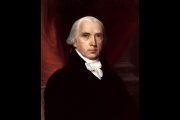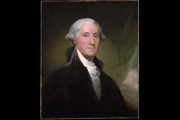The New York Times referred to him as “the war’s biggest hero.” General John J. Pershing, commander of the Allied Expeditionary Forces in World War I, called him “the greatest civilian soldier” of World War I. Upon this war hero’s death in 1964, President Lyndon Johnson issued a statement calling him “a symbol of American courage and sacrifice” who “epitomized the gallantry of American fighting men and their sacrifices in behalf of freedom.”
Few would have guessed at his humble birth in a one-room cabin on December 13, 1887 that Alvin Cullum York would receive such accolades later in life. Born in Pall Mall, Tennessee, Alvin York was the third of 11 children. Raised on a small farm, this son of a poor blacksmith left school after the third grade, and admitted that in his youth he was “wild and bad for five or six years.” He recalled: “I used to drink a lot of moonshine. I used to gamble my wages away week after week. I used to stay out late at night. I had a powerful lot of fist fights…. I knew all the time I was going along this kind of life, deep down in my heart, that I was doing things that were not right.”
Change of Heart
York told of coming home one night “after being very drunk and fighting.” His mother, who had continually pleaded with her son to change his ways, asked him a simple question: “Alvin, when are you going to be a man like your father and your grandfathers?” York recalled, “I promised my mother that night I would never drink again; I would never smoke or chew again; I would never gamble again; I would never cuss or fight again. And I have never drunk any whiskey, I have never touched cards, I have never smoked or chewed, and I have never fought or rough-housed since that night.”
Equally important in changing the course of Alvin York’s life was an event that happened on New Year’s Day, 1915. York wrote later in life that it was on this day that he was “saved” by the preaching of a local evangelist. York embraced Jesus Christ and soon rose to become second elder of his church. He would later give full credit to his faith in God and Jesus Christ for his exploits in battle and safe return from the war.
In June 1917, at age 29, Alvin York received his notice to register for the draft. On the same day York started a diary which he kept faithfully throughout the war. Being called to take up arms in war caused a conflict within York. His ancestors had served in war since the American Revolution and York felt that “my ancestors would want me to do whatever my country demanded of me.” Yet, at the same time, York reasoned that “if I went away to war and fought and killed, according to my reading of the Bible, I weren’t a good Christian.”
York decided that God’s law must take precedent over family tradition or the laws of man. When York registered for the draft he wrote simply on the form, “I don’t want to fight.” He attempted to be exempted by reason that his church forbade its members to kill. But his exemption was denied on the grounds that his church did not expressly prohibit killing during war. York’s crisis of conscience was not settled until, according to York, “I prayed and prayed. I prayed two whole days and a night out on the mountainside.” Ultimately, York decided that God had given him the go-ahead to “answer the call of my country.”
Call to Courage
York arrived in France on May 21, 1918. His unit first saw major action during the St. Mihiel drive in September 1918. By this time York had been promoted to the rank of corporal and given command of a squad. The drive was a success and the American Army moved on to the Argonne Forest for the last major drive of World War I. It was on October 8, 1918 in the Argonne Forest that Corporal Alvin York performed the acts of extreme bravery for which he was awarded the Congressional Medal of Honor.
York’s battalion was charged with advancing across a valley and taking the two hills on the far side. The Germans, however, were dug into the hills with machine gun emplacements and had a complete view of the valley. According to York: “It was kind of a triangular shaped valley. So you see we were getting it from the front and both flanks. Well, the first and second waves got about halfway across the valley and then were held up by machine gun fire from the three sides. It was awful. Our losses were very heavy.”
York and the other squad commanders assigned to the left flank of the advance quickly realized that the hills would be impossible to take from the front without significantly more men. They decided to attempt a sneak attack by advancing around the enemy’s flank and attacking from the rear. At this point the combined forces of the squads, including York’s, was 17 men.
Upon advancing undetected around the enemy’s flank and approaching from the rear the unit stumbled across the headquarters of the machine gun regiment. The Germans were eating breakfast at the time and were completely surprised by the Americans. Most promptly surrendered, but one German shot at York, who quickly killed the German with one shot. The Americans disarmed and assembled the Germans, but by this time the machine gunners on the hill had been alerted to the Americans’ presence. According to York: “There were about 30 of them. They were commanding us from a hillside less than 30 yards away. They couldn’t miss. And they didn’t!” The machine guns took out nine men, including an officer, leaving Corporal York in charge. It was at this point that York began to make history.
As the initial blast of machine gun fire hit the Americans, York was standing out in the open. York wrote in his diary:
Those machine guns were spitting fire and cutting down the undergrowth all around me something awful…. I didn’t have time to dodge behind a tree or dive into the brush, I didn’t even have time to kneel or lie down…. As soon as the machine guns opened fire on me, I began to exchange shots with them.
In order to sight me or to swing their machine guns on me, the Germans had to show their heads above the trench, and every time I saw a head I just touched it off. All the time I kept yelling at them to come down. I didn’t want to kill any more than I had to. But it was they or I. And I was giving them the best I had.
Suddenly a German officer and five men jumped out of the trench and charged me with fixed bayonets. I changed to the old automatic and just touched them off, too. I touched off the sixth man first, then the fifth, then the fourth, then the third, and so on. I wanted them to keep coming. I didn’t want the rear ones to see me touching off the front ones. I was afraid they would drop down and pump a volley into me.
By this time a German major who had already been captured had seen enough. The major, who knew English, told York, “If you don’t shoot any more I’ll make them surrender.” All but one of the Germans came down from the hills. That one German managed to throw a small hand grenade before York killed him. The Americans, whose number had dwindled to eight at this point, then had the complicated task of leading over 80 prisoners through German lines to the American side. York put the German major at the head of the column with him holding his Colt .45 to the major’s back. The seven other men then surrounded the column as best they could.
As York and his men led the captured Germans back through enemy lines, German soldiers and machine gunners attempted to fire on the Americans, but York made the German major order them to surrender. All but one willingly gave up. According to York, “I made the major order him to surrender twice. But he wouldn’t. And I had to touch him off. I hated to do it. But I couldn’t afford to take any chances and so I had to let him have it.”
By the time York and his small squad reached the safety of the American lines they had captured 132 Germans, including three officers. Word quickly spread that York had single-handedly “captured the whole German army.” An Army inspection of the battle scene revealed 28 dead German soldiers. According to the official Army report, York’s description of the battle was accurate though “York’s statement tends to underestimate the desperate odds which he overcame.” When a general asked the inevitable question of how he managed to accomplish his feat, York replied, “Sir, it is not man power. A higher power than man guided and watched over me and told me what to do.” For his bravery, York was given the Medal of Honor, and was also promoted to the rank of sergeant.
Home and Fame
Upon returning to America, Sergeant York was showered with offers of fame and fortune, including a nationwide tour, endorsements, and movie deals. But such was not in York’s character, who claimed, “I … felt that to take money like that would be commercializing my uniform and soldiering.” York wrote in his diary: “It was very nice. But I sure wanted to get back to my people where I belonged, and the little old mother and the little mountain girl who were waiting. And I wanted to be in the mountains again and get out with hounds, and tree a coon or knock over a red fox. And in the midst of the crowds and the dinners and receptions I couldn’t help thinking of these things.”
Alvin York went home to his mountains. He made his way to the same mountainside where he had prayed to God two years earlier for guidance, and there thanked God for bringing him home safely from the war.
In 1927, York established the Alvin C. York Agricultural Institute for the boys and girls of the mountains who had few educational opportunities. By 1937, York was no longer able to operate the school and it became a special part of the Tennessee public school system. In 1941, the story of Alvin York was made into a movie starring Gary Cooper, who won an Academy Award for the role. Alvin York acted as an adviser to the film. In 1952, he suffered a cerebral hemorrhage and became bedridden.
By 1961, Alvin York, one of America’s greatest military heroes, was partially paralyzed, almost completely blind, and virtually penniless. The American government, through the Internal Revenue Service, repaid its debt by suing York for back taxes. The IRS claimed that York’s royalties from the movie, most of which had gone to charity, should be taxed at a higher rate than York had used. In all, the IRS claimed York owed the U.S. government $85,442, plus an additional $87,155 in interest. The IRS offered to settle for $25,000 however, when it became apparent that all of York’s assets totaled together did not equal the $172,597 sought. When the American public was alerted to Sergeant York’s plight, individuals chipped in over $50,000 — which covered the debt with money left over for a trust fund.
Sergeant York lived on for three more years. On September 2, 1964, at the age of 76, Alvin York passed away. His grave, near his home and within sight of the very church where he had been converted in 1915, is marked with a stone monument on which two books are carved — a Bible and a textbook.
Alvin Cullum York was one of the greatest heroes America ever produced. His faith in God, his modest and honorable character, and his sacrifice on behalf of his country continue to command the utmost respect and admiration from Americans. His life serves as a model for future generations of Americans.



